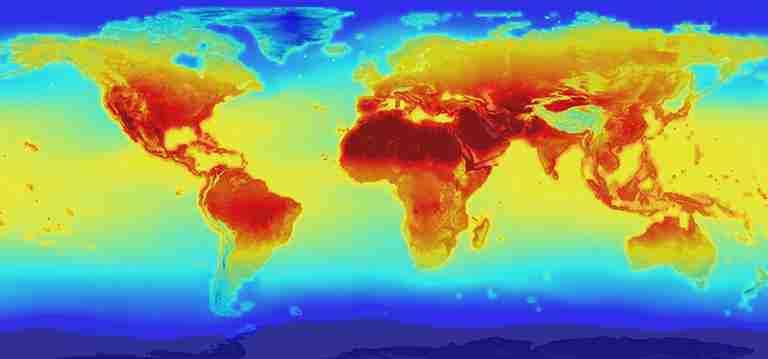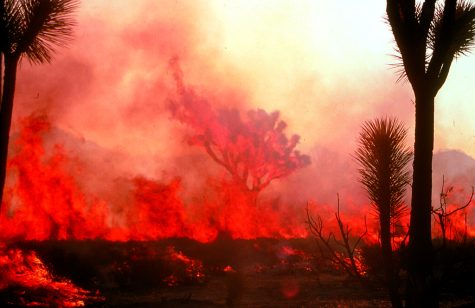Climate change: High priority for scientists, low for most Americans
Recent scientific studies indicate a 10–20 percent chance of human extinction by the end of the century.
The consequences of global warming are happening now. By the end of the century the glaciers of Everest could disappear, but recent studies show most Americans do not agree.
According to the Intergovernmental Panel on Climate Change (IPCC) the Earth’s average temperature could rise anywhere from 2.5 to ten degrees within the century. This is an alarming figure to the National Aeronautic and Space Administration, or NASA.
NASA climate records show evidence found in coral reefs and tree rings that the Earth has maintained a stable average temperature for centuries- during the Ice Age, the Earth was only five degrees cooler.
The IPCC also warns the damage that has been done is severe and even if action is taken now, irreversible consequences are unavoidable.
Prolonged heat waves, melting ice caps, and more severe weather events, and decreasing crop yields are just a few of the symptoms that we are already experiencing.
“It is real. Fact not fiction. The climate is changing and humankind is contributing to that change…the general trend in our society is reactionary and we need to be working much harder.” said Richard Jerousek, professor of Physics and Astronomy at Valencia College.
Climate scientists agree that the primary cause of global warming is the human contribution to the greenhouse effect. The greenhouse effect occurs when solar radiation is trapped in the Earth’s atmosphere by greenhouse gases, such as water vapor, nitrous oxide, carbon dioxide and methane.
According to NASA, humans have increased the concentration carbon dioxide by a third since the Industrial Revolution.
This increase in the atmospheric concentration of greenhouse gases was primarily caused by the burning of fossil fuels. The clearing of land for agriculture and industry have also increased emissions, but to a lesser degree.
Despite the evidence however, most Americans are unconcerned, some even deny that a problem exists.
“Fewer than half of Americans (38%) believe they personally will be harmed a ‘moderate amount’ or a ‘great deal’ by ‘global warming’ states a 2013 study by the Yale School of Forestry and Environmental studies. Skepticism of global warming comes from lack of knowledge of the available evidence.
Some of the most fervent climate change skeptics are our own government representatives.
For instance, Oklahoma senator James Inhofe published a book entitled The Greatest Hoax:How the Global Warming Conspiracy Threatens Your Future in 2012. A book that claimed that climate change caused by humans was a hoax by the United Nations.
Nonetheless, the federal government has become more involved in environmental affairs since the 1970’s. The Clean Air Act of 1970 resulted in a noteworthy shift in the federalgovernment’s role in air pollution control.
Since then, several amendments have been developed to limit emissions of harmful pollutants. According to the Environmental Protection Agency (EPA), one significant amendment was one in 1990. This amendment established a program that would phase out the use of chemicals that deplete the ozone layer.
Recently, the Obama administration has made efforts to diminish the contribution of greenhouse gas production of the United States. Additionally, the Supreme Court ruled in favor of the EPA in the lawsuit Murray Energy v. E.P.A. according to a New York Times Article by Coral Davenport, the lawsuit was filed against the E.P.A for propositions to restrict and reduce carbon dioxide emissions from power plants.
Scientists and science educators are cognizant of the consequences of neglecting climate change as an important issue.
“President Obama is calling for a 30% reduction in greenhouse gases by the year 2030.” Said Valencia College Meteorology professor James Adamski. “While I applaud the president for taking initiative, the measure is far too little and too late.”
Despite the call for a reduction of greenhouse gas emissions, a New York Times Article states that the oil company Shell received approval to drill for oil off the Alaskan Coast.
Although for most Americans climate change falls far behind issues like national security and the economy, within the scientific community, there is a greater sense of urgency.
“It is the most serious problem facing the world. I cannot stress this point enough” said Adamski. “It is not just an environmental issues, it is a health issue, national security issue, economic issue, and food issue. Our very existence depends upon our addressing and dealing with climate change.
“Recent scientific studies indicate a 10 – 20% chance of human extinction by the end of the century if we do not address climate change. It’s that serious.”











